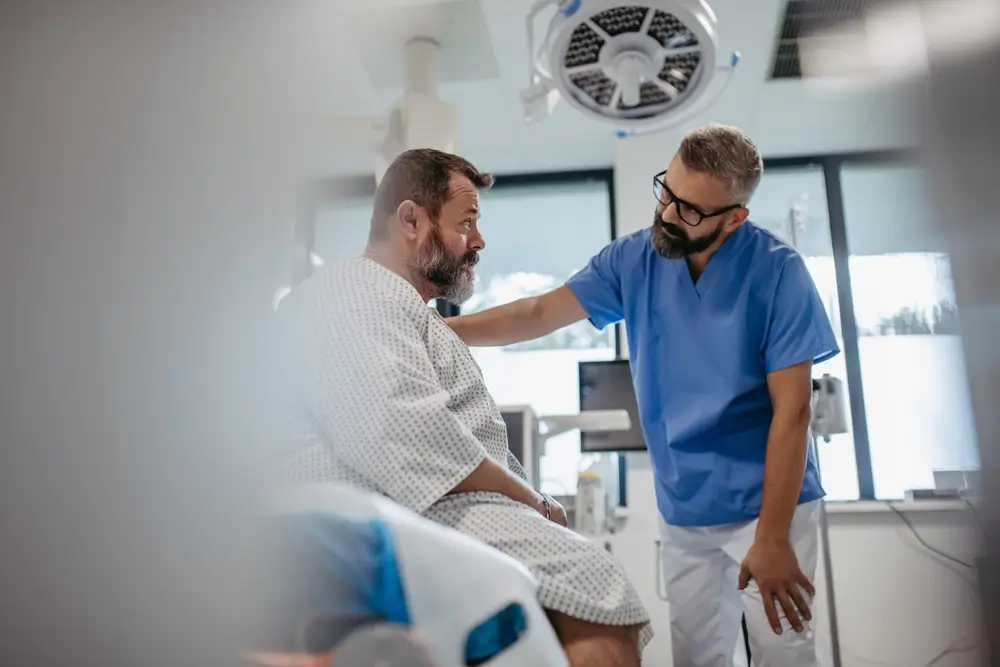A perianal abscess is a painful condition that can affect anyone. Knowing the symptoms, causes, and treatment options is crucial for managing and preventing this condition.
This comprehensive guide provides valuable insights and how to address them effectively.
What is a perianal abscess?
It is an infection that leads to a collection of pus near the anus. It often results from the blockage of anal glands and can cause significant discomfort and pain.

Who is at risk?
Certain factors can increase the risk of developing a perianal abscess:
- Individuals with diabetes
- Those with inflammatory bowel disease (IBD)
- People with compromised immune systems
- Individuals who have recently undergone rectal surgery
What are the symptoms?
Common symptoms of an anal abscess include:
- Burning pain inside anus and swelling in the anus
- Redness and tenderness in the affected area
- Fever and chills
- Painful bowel movements

What causes perianal abscesses?
It is typically caused by an infection in the small anal glands.
The infection can be triggered by:
- Blockages in the anal glands
- Bacterial infections (e.g., staphylococcus)
- Conditions like Crohn’s disease or ulcerative colitis
- Trauma to the anal region
How is a perianal abscess diagnosed?
Diagnosis usually involves a physical examination by a healthcare provider, who will check for swelling, redness, and tenderness. In some cases, imaging tests like an ultrasound or MRI might be required to determine the depth and severity of the abscess.
How to get rid of perianal abscess?
Medical treatment options include:
- Incision and drainage: A minor surgical procedure to drain the abscess.
- Antibiotics: Prescribed to treat or prevent infection.
- Pain relievers: To manage the discomfort associated with the abscess.
How long does it take to heal?
Healing time varies depending on the severity of the abscess and the treatment method used. Generally, it takes a few weeks for the abscess to heal completely, but some cases may require longer.
What are some complications?
If left untreated, a perianal abscess can lead to complications like:
- Fistula (an abnormal connection between the anal canal and the skin)
- Recurring abscesses
- Severe infection that can spread to other areas
How can I prevent a perianal abscess from returning?
To reduce the risk of recurrence:
- Maintain good hygiene
- Stay hydrated and consume a high-fiber diet
- Treat underlying conditions such as IBD or diabetes
- Avoid straining during bowel movements
When should you seek medical attention?
Seek immediate medical attention if you experience:
- Severe pain that doesn’t improve with home treatments
- High fever or chills
- Signs of spreading infection
- Persistent or recurring abscesses
FAQs
Here are some commonly asked questions with answers:
Is perianal abscess life-threatening?
While not typically life-threatening, a perianal abscess can cause serious complications if not treated promptly.
Does stress cause perianal abscess?
Stress alone does not cause, but it can weaken the immune system, making you more susceptible to infections.
Should you pop a perianal abscess?
No, you should never try to pop. This can lead to further infection and complications. Seek medical attention for proper treatment.
What do I do if a perianal abscess bursts?
If an abscess bursts, clean the area gently and keep it dry. Cover it with a sterile bandage and seek medical advice promptly.
How can I take care of a perianal abscess at home?
While professional medical treatment is necessary, you can manage pain with warm sitz baths, over-the-counter pain medication, and proper hygiene.
What’s the difference between hemorrhoids and an abscess?
Hemorrhoids are swollen blood vessels in the rectal area, while an abscess is a pus-filled infection. Hemorrhoids usually cause bleeding and itchiness, whereas abscesses are more often marked by pain and swelling.

Get Expert Help
Perianal abscesses are painful and can lead to serious complications if not treated properly. Early diagnosis and treatment are key to effective management. At Aether Health, our 24/7 trusted emergency room in Pearland, Texas, provides expert care for perianal abscesses and other medical conditions. If you’re experiencing symptoms or need urgent medical attention, don’t hesitate to visit us. You don’t have to resort to anal abscess home remedies online; get real help!



